Daily Vocabulary Words: List of Daily Used Words in Leading International Newspapers
Hi there. Welcome to this special section @ Wordpandit.
Our endeavour here is very simple: to highlight important daily vocabulary words, which you would come across in leading newspapers in the country. We have included the following newspapers in our selection:
• The New York Times
• The Washington Post
• Scientific American
• BBC
• The Guardian
• Psychology Today
• Wall Street Journal
• The Economist
We are putting in extensive work for developing your vocabulary. All you have got to do is be regular with this section and check out this post on a daily basis. This is your repository of words that are commonly used and essentially, we are posting a list of daily used words. Hence, this has significant practical application as it teaches you words that are used commonly in leading publications mentioned above.
Visit the website daily to learn words from leading international newspapers.
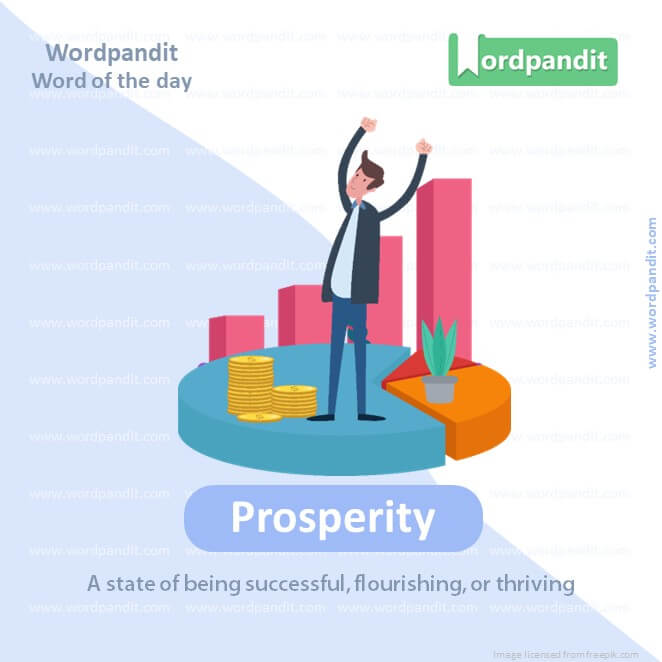
WORD-1: PROSPERITY
CONTEXT: “The government’s economic policies promised a future of shared prosperity for all citizens, but some remain skeptical about its implementation.”
SOURCE: The Economist
EXPLANATORY PARAGRAPH: Imagine having lots of toys, treats, and everything being super happy around you. That’s when you and the people around you have prosperity. It means things are going really well and everyone is happy and rich.
MEANING: A state of being successful, flourishing, or thriving (noun).
PRONUNCIATION: pros-PEAR-it-ee
SYNONYMS: wealth, affluence, richness, success, abundance
USAGE EXAMPLES:
1. The town experienced prosperity after the new factory opened.
2. Everyone hopes for prosperity in the coming year.
3. The country’s prosperity was evident in its tall buildings and busy streets.
4. Prosperity often brings happiness and comfort.
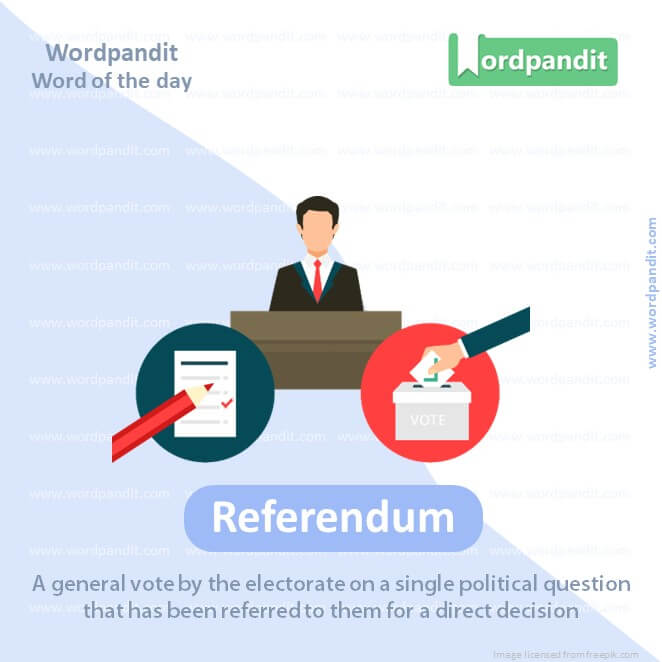
WORD-2: REFERENDUM
CONTEXT: “The upcoming referendum on constitutional amendments has sparked heated debates across the nation, with citizens deeply divided on the proposed changes.”
SOURCE: The Guardian
EXPLANATORY PARAGRAPH: Imagine if all the kids in school were asked to vote on a rule, like “Should we have ice cream every Friday?”. That vote is called a referendum.
MEANING: A general vote by the electorate on a single political question that has been referredto them for a direct decision (noun).
PRONUNCIATION: reh-feh-REN-dum
SYNONYMS: poll, ballot, plebiscite, vote, proposal
USAGE EXAMPLES:
1. The city held a referendum to decide on the new park.
2. Many people voted in the Brexit referendum.
3. The outcome of the referendum was unexpected.
4. The referendum allowed the citizens to voice their opinions.
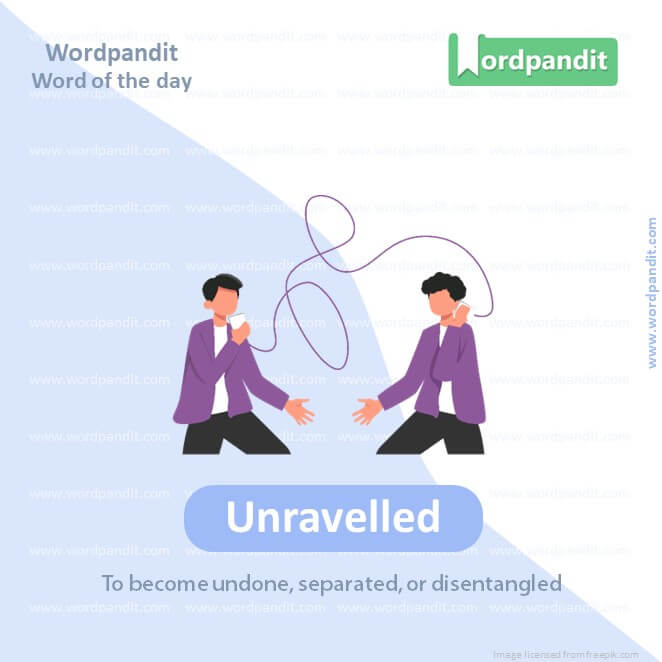
WORD-3: UNRAVELLED
CONTEXT: “As the investigation continued, the complex web of financial transactions began to unravel, revealing a trail of corruption and deceit.”
SOURCE: The Washington Post
EXPLANATORY PARAGRAPH: Think about a ball of yarn. If you pull the end, it might start to unwind and open up. That’s what unravelled means. It’s like something getting untangled or figured out.
MEANING: To become undone, separated, or disentangled (adjective).
PRONUNCIATION: un-RAV-elled
SYNONYMS: untangled, unwound, disentangled, decoded, solved
USAGE EXAMPLES:
1. The mystery was unravelled at the end of the book.
2. The thread unravelled from the fabric.
3. Secrets unravelled as the story progressed.
4. She unravelled the knots in her shoelaces.
WORD-4: CONSTRAINTS
CONTEXT: “The project faced numerous constraints, from budget limitations to environmental concerns, making it a challenging endeavor from the outset.”
SOURCE: Scientific American
EXPLANATORY PARAGRAPH: Imagine you want to run really fast, but there’s something holding you back, like heavy shoes. That thing holding you back is a constraint.
MEANING: Limitations or restrictions (noun).
PRONUNCIATION: con-STRAYNTS
SYNONYMS: restrictions, limitations, confines, restraints, impediments
USAGE EXAMPLES:
1. The project had many constraints, including a tight budget.
2. Time and resources are common constraints in any task.
3. She wanted to paint the entire mural, but space constraints limited her.
4. Financial constraints kept them from traveling.
WORD-5: VILE
CONTEXT: “The hate speech directed at minority communities on social media platforms was condemned as vile and unacceptable by both politicians and civil rights groups.”
SOURCE: The New York Times
EXPLANATORY PARAGRAPH: Vile is like the opposite of nice. If something smells really bad or if someone does something very mean, we can call it vile.
MEANING: Extremely unpleasant or wicked (adjective).
PRONUNCIATION: v-eye-l
SYNONYMS: wicked, foul, nasty, repulsive, disgusting
USAGE EXAMPLES:
1. The villain in the story was a vile character.
2. The food tasted so vile, he couldn’t swallow it.
3. She had a vile temper when she was angry.
4. They were shocked by the vile words spoken.
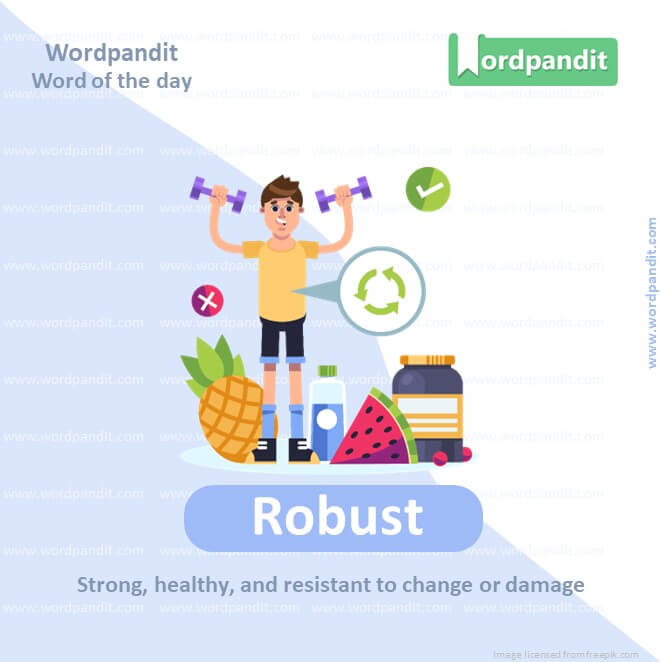
WORD-6: ROBUST
CONTEXT: “The country’s robust healthcare system was put to the test during the recent pandemic, and it proved to be resilient in the face of adversity.”
SOURCE: BBC
EXPLANATORY PARAGRAPH: Imagine a big, strong toy that you can’t easily break. That toy is robust. It means strong and tough.
MEANING: Strong, healthy, and resistant to change or damage (adjective).
PRONUNCIATION: roh-BUST
SYNONYMS: sturdy, durable, strong, resilient, tough
USAGE EXAMPLES:
1. The chair was robust and could hold a lot of weight.
2. She has a robust immune system and rarely gets sick.
3. The company had a robust plan for the future.
4. They built a robust bridge to withstand storms.
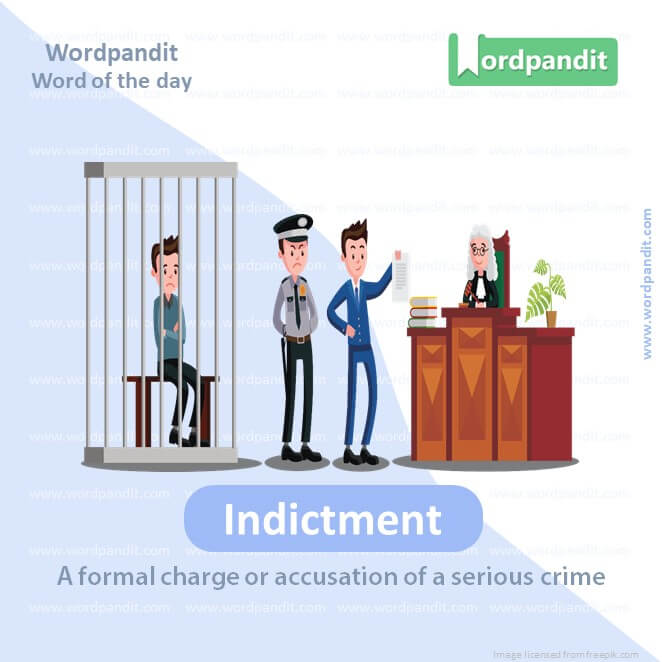
WORD-7: INDICTMENT
CONTEXT: “The grand jury’s indictment of several high-profile figures sent shockwaves through the political landscape, leading to calls for transparency and accountability.”
SOURCE: The Washington Post
EXPLANATORY PARAGRAPH: An indictment is like a big note from grown-ups that says someone might have done something wrong and they need to answer for it in court.
MEANING: A formal charge or accusation of a serious crime (noun).
PRONUNCIATION: in-DIGHT-ment
SYNONYMS: charge, accusation, arraignment, summons, complaint
USAGE EXAMPLES:
1. The grand jury issued an indictment against the mayor.
2. The indictment was for several counts of fraud.
3. Reading the indictment, he realized the seriousness of the charges.
4. After the indictment, he had to appear in court.
WORD-8: INTIMIDATION
CONTEXT: “Reports of voter intimidation at polling stations raised concerns about the fairness and transparency of the election process.”
SOURCE: Al Jazeera
EXPLANATORY PARAGRAPH: You know when someone tries to scare you or make you do something by being mean or showing they’re bigger and stronger? That’s intimidation.
MEANING: The act of frightening or threatening someone to make them do something (noun).
PRONUNCIATION: in-tim-id-AY-shun
SYNONYMS: bullying, threatening, menace, coercion, pressure
USAGE EXAMPLES:
1. The teacher warned against any form of intimidation in class.
2. Intimidation is not a way to make friends.
3. The bigger boy used intimidation to take the smaller kid’s lunch.
4. She faced intimidation at her new workplace.
WORD-9: HARBINGER
CONTEXT: “The recent increase in extreme weather events is seen by many scientists as a harbinger of the broader impacts of climate change.”
SOURCE: Scientific American
EXPLANATORY PARAGRAPH: Imagine if you see dark clouds in the sky. Those clouds can be a sign that rain is coming. That sign or clue is called a harbinger. It tells you something is about to happen.
MEANING: A person or thing that signals or announces the approach of another (noun).
PRONUNCIATION: HAR-bin-jer
SYNONYMS: sign, signal, omen, precursor, indicator
USAGE EXAMPLES:
1. Swallows are often considered a harbinger of spring.
2. The sudden drop in temperature was a harbinger of a coming storm.
3. His early successes were just a harbinger of the greatness to come.
4. The loud noises were the harbinger of the parade’s start.
WORD-10: PROFOUND
CONTEXT: “The artist’s work explored profound themes of identity and belonging, resonating deeply with viewers from all walks of life.”
SOURCE: The Guardian
EXPLANATORY PARAGRAPH: Profound is like when you think really deep thoughts, or feel very strong feelings. Like when you look at the stars and wonder about the universe, that’s profound.
MEANING: Very deep or intense (adjective).
PRONUNCIATION: proh-FOUND
SYNONYMS: deep, intense, heartfelt, meaningful, significant
USAGE EXAMPLES:
1. The movie had a profound impact on her.
2. His words were profound and made everyone think.
3. She had a profound understanding of the subject.
4. The loss had a profound effect on the entire community.







